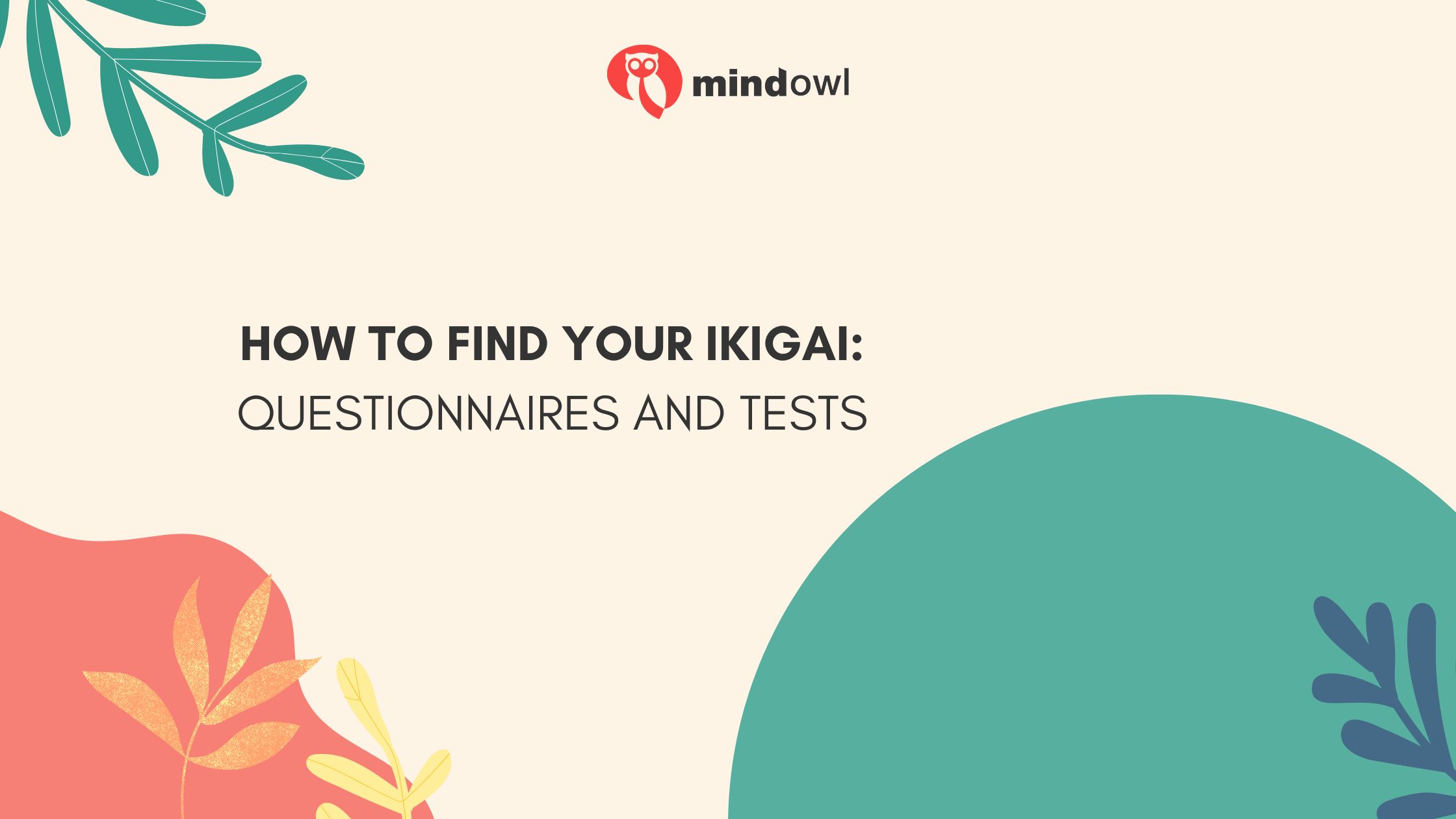
Feeling a bit lost or unfulfilled in life? You’re not alone; many of us are on the hunt for that elusive sense of purpose. Enter ‘Ikigai’, an ancient Japanese philosophy aimed at finding joy and meaning in everyday living.
In this article, we’ll explore helpful tools like questionnaires and tests to uncover your unique Ikigai – let’s unlock the secret to true happiness!
Key Takeaways
- Ikigai is a Japanese concept that focuses on finding purpose and meaning in life.
- Questionnaires and tests can help uncover your unique Ikigai by exploring your passions, talents, values, and the needs of the world around you.
- Finding your Ikigai is crucial for living a meaningful and fulfilling life, as it provides you with purpose and direction.
- The Ikigai – 9 questionnaire consists of 20 questions designed to help individuals determine if they have found their sense of purpose and fulfillment in life.
Understanding Ikigai

Ikigai is a Japanese concept that focuses on finding purpose and meaning in life.
What is Ikigai?
Ikigai is a special word from Japan. It mixes two terms: “iki” and “gai”. The idea of Ikigai helps people find joy, peace, and a reason to be. This concept makes use of your past, what you care for, your hobbies, and the kind of person you are.
Think about it as your life’s goal or why you get out of bed every morning. Each person’s Ikigai is different because we all have unique stories and likes. To find your own Ikigai, there are tests and question lists that can help set you on the right path.
The philosophy behind Ikigai
Ikigai is a way of life from Japan. It gives joy, purpose and peace. You don’t need money to find your Ikigai. It’s about doing things that make you happy and give your life meaning.
For many years, people in Japan have used this idea to live a good life. It helps them know what they like and want to do every day. This is the key thing of the Ikigai concept.
The Importance of Finding Your Ikigai

Finding your Ikigai is crucial for living a meaningful and fulfilling life, as it provides you with purpose and direction.
Living a meaningful and fulfilling life
Living a full and happy life is tied to Ikigai. It gives us joy in what we do each day. With Ikigai, people find reasons to wake up every morning with a smile. This Japanese belief makes us see the beauty in little things.
We learn to love our tasks and find peace in them, not just doing them for money or fame. Each person’s Ikigai is unique – yours could be cooking, teaching kids, painting or helping others.
When you live your Ikigai, you feel worth and value in life.
Finding purpose and direction
Finding purpose and direction in life is an important aspect of living a meaningful and fulfilling life. It involves understanding what truly matters to you and aligning your actions with your values, passions, and talents.
When you find your Ikigai, which roughly translates to “reason for being” in Japanese, you unlock a sense of purpose that brings joy and satisfaction to your everyday existence. Your Ikigai can guide you towards finding a career or vocation that not only makes you happy but also allows you to make a positive impact on the world around you.
By exploring your passions, identifying areas of alignment, and discovering where your talents intersect with what the world needs, you can uncover your unique Ikigai – the sweet spot where personal fulfillment meets meaningful contribution.
The Ikigai Questionnaire
Complete the Ikigai-9 questionnaire, which consists of a step-by-step guide to help you identify your passions, talents, and values, and find your unique ikigai.
Ikigai-9 questionnaire
The Ikigai-9 questionnaire is a tool that consists of 20 questions designed to help individuals determine if they have found their Ikigai, or sense of purpose and fulfillment in life.
Created by Imai et al., this psychometric tool evaluates an individual’s level of Ikigai based on their responses. The questionnaire is available as a PDF and can be used as a step-by-step guide to discovering one’s Ikigai.
Research shows that having a strong sense of Ikigai is associated with greater well-being and lower levels of depression, anxiety, and stress. By answering the questions provided in the questionnaire, individuals can gain insight into what truly matters to them and find direction for living a meaningful life.
Step-by-step guide to answering the Ikigai questionnaire
To find your Ikigai, follow this step-by-step guide to answering the Ikigai questionnaire:
- Start by reflecting on your passions and interests. Think about the activities that bring you joy and fulfillment.
- Consider your skills and talents. What are you naturally good at? What do others often turn to you for help with?
- Reflect on what is valuable and important to you in life. What principles or values do you hold dear? What causes or issues are you passionate about?
- Identify areas of overlap between your passions, skills, and values. Look for opportunities where these elements align.
- Ask yourself: How can I use my passions, skills, and values to make a positive impact on the world around me? Consider different career paths or roles where you can contribute and find meaning.
- Continue exploring and experimenting with different possibilities until you find a unique combination that resonates with you. Your Ikigai lies at the intersection of what you love, what you are good at, what the world needs, and what you can be paid for.
- Create a visual representation of your Ikigai using a diagram or worksheet. This will help you visualize the different elements and how they intersect.
- Develop a plan and set goals based on your Ikigai. Break them down into smaller steps that are achievable.
- Incorporate rituals, hobbies, or meaningful relationships into your daily routine that align with your Ikigai. These activities will bring more joy and fulfillment to your life.
- Find ways to enable your Ikigai to flourish in different areas of your life, such as work, relationships, and personal growth. Look for opportunities to make a positive impact and live out your purpose.
Exploring your passions, talents, and values
- Reflect on activities that bring you joy and make you feel energized.
- Think about the skills and talents that come naturally to you.
- Consider what values are important to you and align with your beliefs.
- Explore different hobbies and interests to discover new passions.
- Pay attention to moments when you feel fulfilled and engaged in what you’re doing.
Identifying areas of alignment and overlap
Finding your ikigai involves identifying areas of alignment and overlap in your life. Here are some key points to consider:
- Reflect on your passions: Think about the activities or hobbies that bring you joy and fulfillment. These are the things that you genuinely enjoy and could spend hours doing.
- Consider your talents: Identify your unique skills, abilities, and strengths. These are the things that come naturally to you or that you excel at.
- Explore your values: Reflect on what is truly important to you and what values guide your decisions and actions. These can be principles like honesty, integrity, compassion, or justice.
- Look for areas of overlap: Find connections between your passions, talents, and values. Look for opportunities where these elements align or complement each other.
- Seek meaningful contribution: Consider how you can use your passions, talents, and values to make a positive impact on others or society as a whole. This could be through volunteering, helping others, or pursuing a career that aligns with your values.
- Evaluate financial viability: While it’s essential to find fulfillment in what you do, it’s also crucial to consider the financial aspect. Evaluate whether the activities or careers aligned with your ikigai can support you financially.
Finding your unique Ikigai
To find your unique Ikigai, start by reflecting on what you love to do, what you’re good at, what the world needs, and what you can get paid for. These four questions can help guide you towards discovering your purpose and passion in life.
Remember that your Ikigai is personal and unique to who you are as an individual. It’s about finding the intersection of your passions, talents, values, and the needs of the world around you.
Take time to explore different activities and areas of interest to identify where these elements align and overlap. By doing so, you’ll be able to uncover your own special Ikigai – a reason for jumping out of bed every morning with a strong sense of purpose that makes life meaningful and fulfilling.
Other Tools and Tests for Discovering Your Ikigai
– Exploring online Ikigai tests and questionnaires that can help you uncover your life purpose.
– Using personality assessments and career quizzes to gain insights into your strengths and interests.
– Discovering the power of the Dispositional Flow Scale-2 (DFS-2) in finding your true purpose.
Online Ikigai tests and questionnaires
- There are online tests and questionnaires available for individuals to discover their Ikigai and true purpose.
- These tests can provide insights into one’s Ikigai and are easy to complete within 10 minutes.
- The Ikigai questionnaire asks 20 questions to help determine areas of life that need focus or change.
- There is a free personality test available online specifically designed to help individuals find their true purpose, known as the Ikigai personality test.
Personality assessments and career quizzes
Personality assessments and career quizzes are useful tools for discovering your Ikigai. Here are some benefits of using these tools:
- Gain self-awareness: Personality assessments can help you understand your strengths, weaknesses, and unique qualities. This knowledge can guide you towards finding a career that aligns with your natural abilities.
- Explore interests: Career quizzes offer an opportunity to explore different fields and industries. By answering questions about your preferences, you can uncover areas that spark your curiosity and passion.
- Identify compatible career paths: These tests often provide insights into suitable careers based on your personality traits and interests. They can suggest occupations that align with your values, skills, and Ikigai.
- Narrow down options: With the vast array of career choices available, these assessments can help narrow down the options to those that are most aligned with your Ikigai.
- Validate choices: If you already have an idea about your Ikigai or a specific career path, these tests can validate your decision or provide alternative perspectives worth considering.
Uncovering your strengths and interests
To uncover your strengths and interests in relation to finding your ikigai, there are various tools and tests available. One example is the IKIGAI personality test, which helps you identify your true purpose and passion.
Another option is an ikigai questionnaire consisting of 20 questions that can highlight areas in your life that need focus or change. By answering these questions and mapping out your personal ikigai, you can start exploring what feels right for you.
It’s important to remember that this process is an ongoing journey, so it’s recommended to test different paths and build a support system along the way.
Dispositional Flow Scale-2 (DFS-2)
The Dispositional Flow Scale-2 (DFS-2) is a tool used to measure flow, which refers to the state of being completely absorbed and engaged in an activity. It can be helpful in finding your Ikigai because it assesses the subjective experience of flow and its relationship to purpose and meaning in life.
Developed by Jackson and Eklund, the DFS-2 provides a practical way to measure dispositional flow and your ability to enter optimal flow states. By understanding your tendency towards experiencing flow, you can better align your activities with your passions and values, helping you find fulfillment in pursuing your Ikigai.
Applying Your Ikigai to Everyday Life
– Creating a visual representation of your Ikigai
– Developing a plan and setting goals
– Incorporating rituals, hobbies, and meaningful relationships
– Enabling your Ikigai to flourish in different areas of life
Discover how you can apply your Ikigai to everyday life and live with purpose and fulfillment. Read more to find out!
Creating a visual representation of your Ikigai
To create a visual representation of your Ikigai, you can use the evolved Ikigai diagram, also known as “Ikigai 2.0.” This diagram helps you identify and visualize the four important areas of your life: what you love, what you’re good at, what the world needs, and what you can be paid for.
By mapping out these aspects on the diagram, you can see where they intersect and find your unique Ikigai. It’s a helpful tool to gain clarity about your purpose in life and make decisions that align with it.
So grab a pen and paper or use an online template to create your own Ikigai diagram today!
Developing a plan and setting goals
Developing a plan and setting goals is an important step in applying your Ikigai to everyday life. It helps you create purpose and find direction. Here are some reasons why developing a plan and setting goals is crucial:
- Boosts well-being: When you have a plan and clear goals, it gives you something to work towards, which can increase your overall sense of well-being.
- Enhances positive relationships: Setting goals can help you prioritize your relationships and make time for the people who matter most to you.
- Promotes good health: Having a plan and specific goals can motivate you to take care of your physical and mental health.
- Provides more energy: When you have clear goals, it gives you a sense of purpose, which can boost your energy levels and motivation.
Incorporating rituals, hobbies, and meaningful relationships
- Make time for daily rituals that bring you joy and help you connect with your inner self, such as meditation, journaling, or practicing gratitude.
- Engage in hobbies and activities that ignite your passion and provide a sense of fulfillment. This could be anything from painting, dancing, gardening, or playing a musical instrument.
- Cultivate meaningful relationships with family, friends, and community members who support and inspire you. Surround yourself with positive influences who share similar values and interests.
- Create a balance between work and personal life by setting boundaries and prioritizing self – care. Take breaks to engage in activities that rejuvenate your mind and body.
- Collaborate with others on projects or initiatives that align with your passions and values. Find ways to contribute to causes or organizations that resonate with you.
- Share your knowledge and experiences with others through teaching or mentoring. Helping others discover their own Ikigai can be deeply rewarding.
- Regularly reflect on your progress towards living a life aligned with your Ikigai. Adjust goals as necessary and stay open to new opportunities for growth.
Remember, finding your Ikigai is an ongoing journey. It requires self-reflection, exploration of passions, and continuous effort to live authentically according to what brings you joy and fulfillment. By incorporating rituals, hobbies, and fostering meaningful relationships in your everyday life, you can create a lifestyle that embraces the essence of Ikigai.
Enabling your Ikigai to flourish in different areas of life
To enable your Ikigai to flourish in different areas of life, it’s important to find ways to incorporate it into various aspects of your daily routines and relationships. This could mean creating a visual representation of your Ikigai, such as a diagram or journaling about it regularly.
It also involves developing a plan and setting goals that align with your purpose, whether they are related to your career, hobbies, or personal growth. Additionally, incorporating rituals and meaningful relationships can help nurture your sense of purpose and fulfillment.
By actively seeking opportunities for alignment between your passions, talents, values, and the world’s needs in different areas of life – be it work, family or personal pursuits – you can truly live out your Ikigai and experience a more meaningful and satisfying life overall.
Overcoming Challenges and Obstacles
Identifying barriers that hold you back from living your Ikigai, strategies for overcoming fear and resistance, and embracing growth and change.
Identifying barriers that hold you back from living your Ikigai
Discovering and living your Ikigai can be hindered by various barriers that exist within ourselves and our external environment. These barriers may include fear, self-doubt, societal pressures, lack of clarity, or even a sense of limitations.
It is essential to identify these barriers in order to overcome them and fully embrace your Ikigai. By recognizing what holds you back, you can develop strategies to address and overcome these obstacles.
This might involve challenging negative beliefs, seeking support from others, setting achievable goals, or making changes to your lifestyle or mindset. Remember that living your Ikigai is an ongoing journey, and overcoming obstacles will help you move closer towards a more purposeful and fulfilling life.
Strategies for overcoming fear and resistance
Overcoming fear and resistance can be challenging, but it’s possible with the right strategies. Here are some tips to help you conquer your fears and push through resistance:
- Acknowledge your fear: Recognize that fear is a natural part of the process. It’s okay to feel scared or uncertain, but don’t let it hold you back from pursuing your ikigai.
- Break it down: Sometimes, fear stems from feeling overwhelmed by the unknown. Break down your goals into smaller, manageable tasks. Focus on one step at a time, and gradually build momentum.
- Embrace failure as learning: Fear of failure often hinders progress. Instead of viewing failure as a setback, see it as an opportunity for growth and learning. Use each setback as a chance to improve and refine your approach.
- Find support: Surround yourself with people who believe in you and your journey towards finding your ikigai. Seek guidance from mentors or join communities that share similar aspirations. Having a support system can provide encouragement and accountability.
- Practice self-compassion: Be kind to yourself throughout the process. Understand that finding your ikigai takes time, and it’s normal to face setbacks along the way. Treat yourself with compassion and remind yourself that every step forward is progress.
- Visualize success: Imagine what it would feel like to live a life aligned with your ikigai. Visualize the positive outcomes and benefits that come from overcoming fear and resistance. Use this vision as motivation to keep pushing forward.
Embracing growth and change
Embracing growth and change is an essential part of living your ikigai. It’s important to understand that the journey towards finding and embracing your purpose is ongoing, and it may evolve over time.
Embracing growth means being open to new experiences, learning from challenges, and continuously evolving as a person. Change is inevitable, and by embracing it, you can discover new opportunities for personal and professional development.
Remember that setbacks are a natural part of life, but they shouldn’t deter you from pursuing your ikigai. Instead, see them as valuable lessons that contribute to your growth. By embracing growth and change, you can fully embrace the potential of your ikigai and live a more fulfilling and meaningful life.
Conclusion
In conclusion, questionnaires and tests can be helpful tools in your journey to find your Ikigai. By exploring your passions, talents, values, and the needs of the world around you, you can discover a sense of purpose and direction in life.
Remember that finding your Ikigai is an ongoing process, so be patient with yourself and enjoy the exploration. Embrace the opportunity to live a meaningful and fulfilling life by uncovering what truly brings you joy and satisfaction.
FAQs
Q: Can finding my Ikigai change over time?
Yes, finding your Ikigai is not a one-time event but an ongoing journey. As you grow and evolve throughout life’s phases or experiences shape your priorities may shift leading to changes in what gives meaning or purpose to you – evolving as per the situation is part of the process
Q: What is the concept of ikigai?
A: Ikigai is a Japanese concept that means “a reason for being” or “a reason to wake up in the morning.” It refers to finding your life’s purpose, your reason for being, and the things that bring you joy and fulfillment.
Q: How can finding your ikigai help you live a more fulfilling life?
A: Finding your ikigai can help you live a more fulfilling life because it helps you align your actions and choices with your true purpose and passions. When you have a clear understanding of your ikigai, you can make decisions that lead to a deeper sense of meaning and happiness.
Q: Are there any questionnaires or tests that can help you find your ikigai?
A: Yes, there are questionnaires and tests available that can help you discover your ikigai. These tools are designed to ask you thought-provoking questions about your interests, skills, values, and desires to help you uncover your true passion and purpose.
Q: How can finding your ikigai help you find a career that makes you happy?
A: Finding your ikigai can help you find a career that makes you happy because it enables you to identify the activities and fields that align with your passions and purpose. When you are engaged in work that is meaningful to you, you are more likely to experience job satisfaction and fulfillment.
Q: Can finding your ikigai improve your overall wellbeing?
A: Yes, finding your ikigai can improve your overall wellbeing. When you are living in alignment with your purpose and doing what brings you joy, you are more likely to experience a sense of fulfillment, contentment, and a positive outlook on life.
Q: Is it necessary to have a specific career tied to your ikigai?
A: No, it is not necessary to have a specific career tied to your ikigai. Your ikigai can extend beyond your professional life and encompass various aspects of your personal life as well. It is about finding and living your purpose in all areas, not just in one specific career.
Q: Does ikigai come naturally or is it something that needs to be actively pursued?
A: The discovery and pursuit of ikigai can vary from person to person. For some people, their ikigai may come naturally and be an intrinsic part of who they are. For others, it may require active exploration, introspection, and making conscious choices to align their lives with their purpose.
Q: Can your ikigai change over time?
A: Yes, your ikigai can change over time. As you grow, evolve, and gain new experiences, your passions, values, and purpose may also shift. It is important to regularly reassess and reflect on your ikigai to ensure that you are still living in alignment with your true self.
Q: Do you need to have one specific ikigai, or can you have multiple ikigai?
A: It is possible to have multiple ikigai, each representing different areas of your life that bring you joy and fulfillment. Your ikigai can be diverse and encompass various aspects such as family, hobbies, relationships, and career. It is not limited to just one singular purpose.
Q: Is there an end to your ikigai practice, or is it a lifelong journey?
A: Your ikigai practice is a lifelong journey. Finding and living your ikigai is an ongoing process of self-discovery, growth, and alignment. It requires continuous reflection, adaptation, and nurturing to ensure that you are always connected to your purpose and living a fulfilled life.
MindOwl Founder – My own struggles in life have led me to this path of understanding the human condition. I graduated with a bachelor’s degree in philosophy before completing a master’s degree in psychology at Regent’s University London. I then completed a postgraduate diploma in philosophical counselling before being trained in ACT (Acceptance and commitment therapy).
I’ve spent the last eight years studying the encounter of meditative practices with modern psychology.

